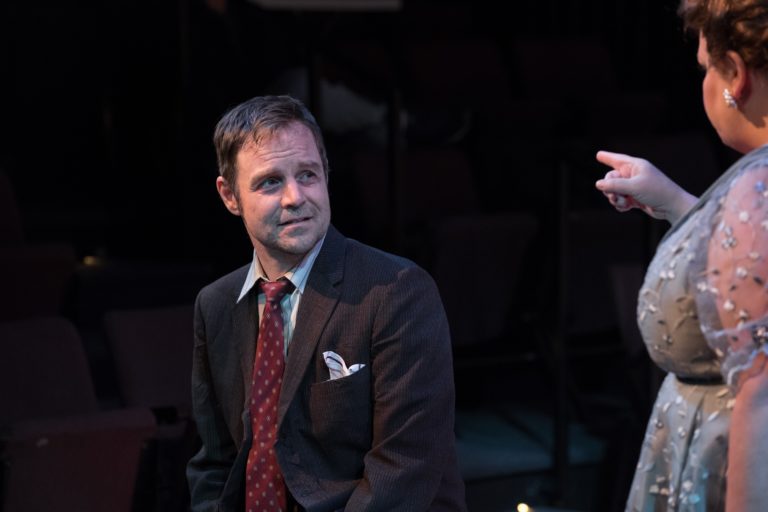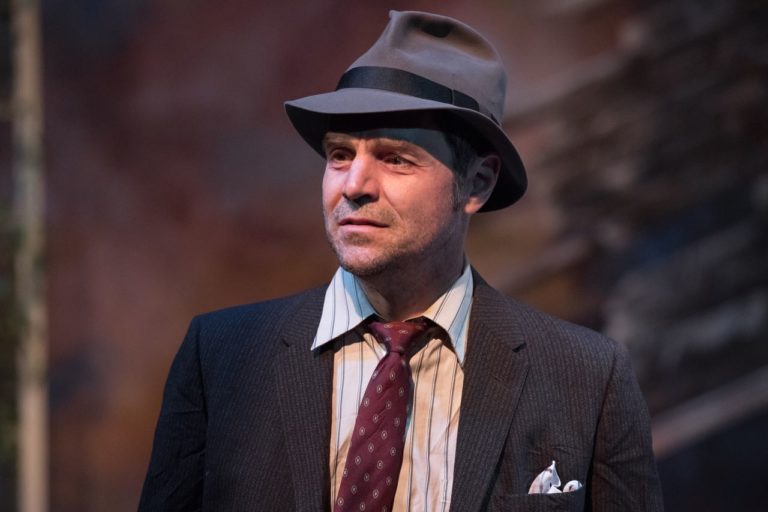
Review: Geoffrey Kent Steals the Show as Iago in the CSF’s Othello
This is the second time in two years I’ve watched actor Geoffrey Kent walk away with a production in which he’s not actually the lead. Last year his Hotspur stole every scene of Henry IV, Part One that he entered. Now Kent is playing Iago in the Colorado Shakespeare Festival’s Othello — and he’s the best reason to see the play.
You remember Iago: He’s the embodiment of pure evil, a hissing snake, a whispering devil who epitomizes the power of malign gossip. In this dark and majestic tragedy, Iago is passed over for promotion by the great general Othello and resolves to take his revenge. At least, that’s the most apparent motive for his villainy. The Moor Othello has won the love of a beautiful Venetian, Desdemona, with his stories of valor and adventure; on the eve of an expected battle with the Turks, the two of them have secretly married. Those menacing Turks vanish quickly from the story, and it becomes an account of the fall of a hero, as Iago plays on the general’s weaknesses and persuades him that Desdemona is unfaithful. The result is murder.
Issues of class, race and gender propel the story — and director Lisa Wolpe has chosen to underline them. Desdemona is often played as a Patient Griselda, like Chaucer’s character entirely obedient to her lord through test after test. Here, though, she’s more modern, spunky and flirtatious. And it’s not enough that Desdemona’s father, Brabantio, utters the required racial epithets about her husband in denouncing the marriage; he must also spit out his rage and contempt for the daughter he now sees as forever defiled. Under Wolpe’s direction, the relationship between Desdemona and her maid Emilia — Iago’s wife — has shifted too, though not in ways I can easily parse. Emilia helps Iago in his schemes against Othello, and critics have been divided over her motives. Is she afraid of her husband? Does she love him so much that she willingly does his bidding? Is she unaware of the disastrous effects of his plots, or is she half-aware but stifling her own compunctions? In this production, Emilia seems to positively dislike Desdemona through much of the play, perhaps because of class resentment or envy of Desdemona’s seemingly happy marriage, but she rises magnificently to Desdemona’s defense in the face of Othello’s murderous rage.
Iago’s motives represent another critical conundrum; it isn’t clear that the mayhem he unleashes is caused only by his chagrin at being passed over. He says more than once that Othello has slept with Emilia, though it’s unlikely he actually believes this, given his deep understanding of Othello’s character. Perhaps Iago has his own problems with women; perhaps he, too, is well acquainted with irrational jealousy.
With his strong presence and resonant voice, Peter Macon is perfect for the role of Othello. But he speaks the language oddly, running some phrases together, drawing out or yelling others, so tic-y and eccentric that you tend to see him not as a great-souled man brought low, but as someone who had a bit of a screw loose to begin with. And there’s no chemistry between him and Laura Baranik’s Desdemona — who herself seems less like an unexpectedly strong woman in a terrifying situation than a willful rich kid. All of which leaves an emptiness at the heart of the production. But Vanessa Morosco’s performance as Emilia is very good — passionate and articulate — even if I could never quite understand the Lady Macbeth-like figure she presents at first, or fathom this Emilia’s relationship with Iago, an irrational violent man of whom she never seems the least afraid.
As for Iago: Kent lives the role moment by moment. You can see him actually thinking things through, and you’re never quite sure what tack he’ll take. Sometimes — usually when he’s actually in the act of manipulating someone — he works with crystal clarity and an infectious joy. At other moments, he wavers and calculates as an unexpected event forces him to choose between possibilities. And he operates with such charm that you find yourself shocked when you realize what he’s actually capable of. It’s like working on a suicide-prevention hotline, as volunteers in Seattle once did, and discovering that the nice, articulate man beside you is Ted Bundy.




